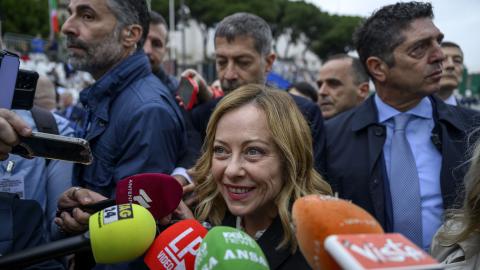The upcoming European Parliament elections will almost certainly reshape the European Union’s political makeup and expand the influence of conservative Italian Prime Minister Giorgia Meloni.
Meloni, who is president of the European Conservatives and Reformists Group (ECR), is being courted from the left and right. France’s Marine Le Pen recently proposed the idea of uniting ECR with the populist Identity and Democracy (ID) grouping, in which case Le Pen’s National Rally sits ready to form a significant parliamentary bloc.
Similarly, European Commission President Ursula von der Leyen, from the center-right European People’s Party Group (EPP), has made clear her interest in working with Meloni post-election.
Meloni has poured cold water on the idea of an ECR-ID merger, but stated there is “room for change” in the new parliament. “I want to try to do in Europe what we did in Italy; it is not easy, but it is fascinating,” Meloni recently said. The current Italian national parliamentary majority is made up of three main parties, each of which aligns with a different European political force: Fratelli d’Italia (ECR), Lega (ID), and Forza Italia (EPP).
In the EU Parliament, rather than assembling a formal coalition with populist ID, Meloni will seek to impart a conservative shift by frequently changing ECR’s partners and assembling voting blocs depending on the issue at hand.
For example, Meloni might align with ID, the conservative Non-Inscrits (NI) group, and some EPP parties on issues of migration, the green agenda, and national sovereignty. On support for Ukraine, she may pursue alignment with EPP, the Progressive Alliance of Socialists and Democrats (S&D), liberal Renew Europe (RE), and the left-leaning Greens.
ECR is set to attain a larger role in the policy direction of the next parliament. Meloni’s Brothers of Italy are set to overtake Poland’s Law and Justice Party as the largest delegation within ECR, leaving the Italian prime minister as the undisputed leader of the conservatives. From this perch, Meloni will seek to orchestrate a concerted policy shift in parliament. Herding the cats will not be easy, but it promises rich rewards.
According to Politicopolls, the next parliament will be even more fractious. EPP will likely return as the largest party with 165 seats, followed by S&D at 143 seats. The liberal RE grouping and Meloni’s ECR are neck and neck for third, each winning between 75 and 80 seats. ID follows with 68 seats and the conservative NI group, which includes the Hungarian Prime Minister Viktor Orbán’s Fidesz party, is projected to win 57 seats in June. The Greens, the Left, and unaffiliated parties are expected to win smaller shares of the pie.
Coalition formation is set to be tortuous. Center-right EPP could align once again with left of center S&D, but EPP would need either ECR or RE to attain a majority. While unlikely, a coalition of ECR, ID, and EPP would still likely fall short of a majority. An EPP-ECR-RE coalition is likewise projected to fall short. For EPP to retain power, current projections show the easiest pathway is to align with the Left, shutting out Meloni once again.
But coalition formation is only one facet of the story. The momentum will be determined more importantly by members’ votes on specific issues. Here, growing divides within the larger parliamentary groupings open a door to a more conservative pathway.
Internally, the EPP is increasingly split between a conservative wing and another that is more inclined to recreate the usual alliance—both formally and on specific policies—with the Socialists. Furthermore, it remains to be proven that Renew Europe is solidly cohesive: last March, Euractiv reported that the EU liberals were riddled with “internal divisions.”
A fractious parliament combined with an overarching shift in the number of MEPs hailing from the right of the political spectrum spells an opportunity for Meloni to collect enough votes to move policy in a more conservative direction—a position that could align more closely with a potential trend shift in Washington post-November.
Indeed, an EU Parliament primarily based on the policy prescriptions of ECR and EPP would strengthen transatlantic relations.
By comparison, the current EPP-S&D nexus has led to disastrous policy outcomes. The current and previous European Commission had two PES members as high representativesof the European Union for foreign affairs: Federica Mogherini, who negotiated the controversial Iranian nuclear deal in 2015, and Josep Borrell who, attempted to relaunch it. To make matters worse, during their tenure, Brussels also strengthened relations with Cuba and China.
A parliament where RE plays kingmaker also does not guarantee strong transatlantic outcomes. Emmanuel Macron, whose Renaissance Party dominates the group, aims to distance Brussels from Washington, crafting a third pole in world affairs and replacing the US as the main guarantor of European defense. This policy weakens transatlantic solidarity, strengthens isolationist forces in the US, and makes Europe more vulnerable to both Russia and China.
Similarly, the EU’s Green Agenda, championed by RE, S&D, the Greens, and some in the EPP, leaves Europe at the mercy of Chinese solar panels, wind turbines, and raw materials, while concurrently slashing European competitiveness and imposing significant cost to taxpayers.
The incongruence between the EU’s current momentum and US policy will be palpable should President Joe Biden lose reelection. But a second Trump administration would revitalize US policy in key areas including energy, Iranian aggression, migration, and national sovereignty.
In two weeks, Meloni is likely to find herself in the unique position of moving EU policy in a decidedly conservative direction, which will pay dividends for transatlantic unity if the US also sees a conservative shift in November. Once the votes are in, expect all eyes to look to Rome.
Stefano Graziosi is an essayist and a political analyst who writes for the Italian newspaper La Verità and the weekly magazine Panorama. Daniel Kochis is a Senior Fellow in the Center on Europe and Eurasia at Hudson Institute.


















